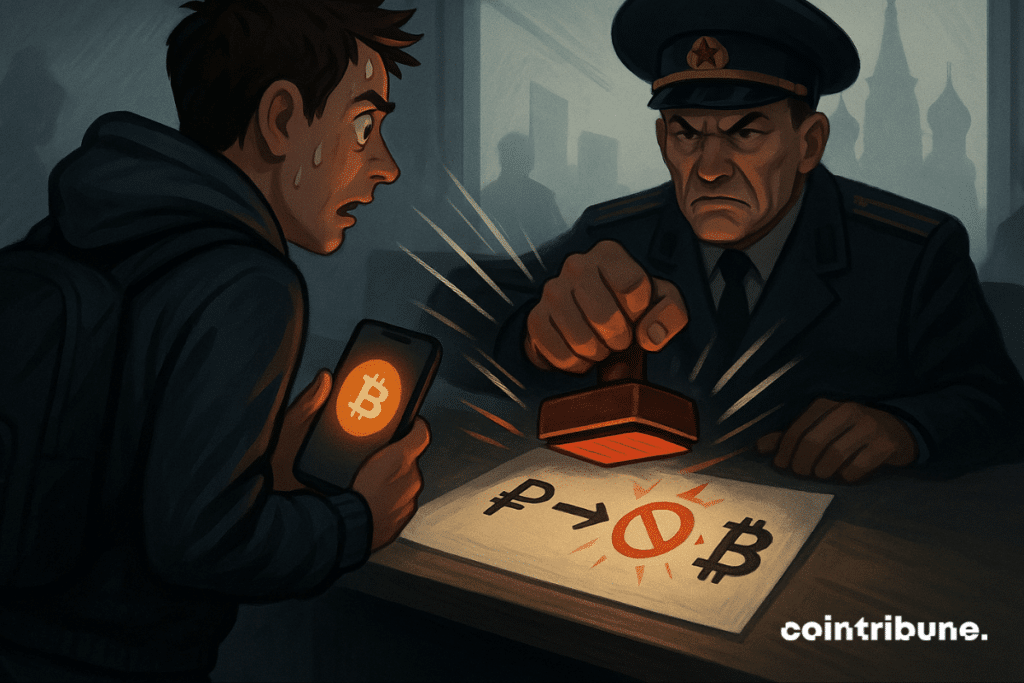Russia’s Cash Crackdown Creates Major Headaches for Crypto Traders
Moscow slams brakes on capital movement—digital asset traders scramble for workarounds.
New Controls, New Challenges
Russia's latest financial regulations tighten grip on cash flows, forcing crypto enthusiasts to navigate increasingly complex barriers. The moves target informal currency operations but hit digital asset traders hardest—adding layers of verification and reducing liquidity access.
Traders Adapt or Exit
Seasoned crypto players pivot to peer-to-peer networks and offshore platforms. Others hedge with stablecoins or simply move operations abroad. The usual dance: regulators build walls, traders find ladders. Meanwhile, traditional banks smirk—watching crypto's 'disruption' get disrupted by paperwork.
Another reminder: financial innovation moves faster than bureaucracy, but bureaucracy has bigger guns.

In brief
- Russia limits ATM withdrawals to ₽50,000 per day for 48 hours if transactions appear suspicious.
- Analysts warn that these ATM restrictions could disrupt cash-heavy cryptocurrency operations, forcing exchanges and peer-to-peer platforms to adjust their business models.
- Experts recommend using cards with regular transaction histories and transferring funds only to trusted parties, warning that stricter rules could follow.
Banks Flag Suspicious Transactions
The Central Bank of Russia (CBR) has emphasized the urgent need to address fraudulent activity. In the second quarter of 2025, fraudsters reportedly carried out 273,100 scams totaling ₽6.3 billion. To curb this, the CBR issued guidelines that help banks identify potentially risky transactions.
- Withdrawals made at unusual times, for uncommon amounts, or at ATMs rarely used by the customer should be considered warning signs by banks.
- Using QR codes or virtual cards instead of regular payment cards must be flagged as a potential indicator of fraud.
- Sudden changes in a customer’s phone activity, including altered call patterns or an increase in messages from unknown numbers within six hours before a withdrawal, are to be treated as suspicious behavior.
- Cash withdrawals conducted shortly after taking a loan, increasing withdrawal limits, receiving transfers over ₽200,000 via the Faster Payments System, or closing a deposit early should be recognized as possible signs of fraudulent activity.
- Altering the phone number for online banking or using a device with changed characteristics or malware can also raise red flags.
Impact on Crypto Businesses
Analysts warn that these measures could disrupt cash-dependent cryptocurrency operations. Denis Polyakov, head of digital economy practice at GMT Legal, noted that crypto exchanges will need to adjust their business models. Large cash withdrawals are now largely restricted to bank branches, which could slow transaction speeds and create challenges for those handling cash on behalf of these platforms.
Despite these operational hurdles, legal changes are considered a more pressing concern. Ignat Likhunov, founder of the Cartesius legal agency, pointed out that restrictions on cash withdrawals are not the main challenge for crypto businesses.
He added that the amended Article 187 of Russia’s Criminal Code, which governs the circulation of payment instruments, now makes using another person’s bank card illegal. He noted that Russian authorities have already begun questioning money mules, and the scope has now expanded to include cryptocurrency traders.
Regulatory Pressure and Risks for Crypto Traders
Cryptopolitan reported that Russia is stepping up controls over crypto, with certain activities now carrying penalties, including restrictions on bank accounts. Likhunov suggests that crypto traders can reduce exposure by using cards with established transaction histories and limiting fund transfers to trusted parties.
Likhunov also offered a prediction on the future of crypto in Russia, suggesting that additional restrictions—or even a full ban—could be introduced in the coming months. This view aligns with the Central Bank’s cautious approach. In July, TASS reported remarks by Governor Elvira Nabiullina, who said the Bank of Russia has no plans to invest in cryptocurrencies because of their volatility and risk, while emphasizing that digital assets remain unsuitable for domestic payments.
Maximize your Cointribune experience with our "Read to Earn" program! For every article you read, earn points and access exclusive rewards. Sign up now and start earning benefits.

